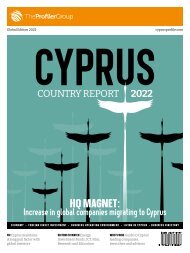2020 Cyprus Country Report
The 2020 Cyprus Country Report features in-depth articles on the economy, foreign direct investment, international trade and headquartering as well as detailed sector profiles and insights from Cyprus’ 100 most influential political, economic and business leaders shaping the future of their country and its industries.
The 2020 Cyprus Country Report features in-depth articles on the economy, foreign direct investment, international trade and headquartering as well as detailed sector profiles and insights from Cyprus’ 100 most influential political, economic and business leaders shaping the future of their country and its industries.
Create successful ePaper yourself
Turn your PDF publications into a flip-book with our unique Google optimized e-Paper software.
u <strong>Cyprus</strong> cannot compete<br />
with countries that<br />
produce huge volumes<br />
at low cost, but what<br />
the country can excel<br />
at is quality, organic<br />
farming, bioproduction<br />
and superfoods<br />
u To promote the quality<br />
of <strong>Cyprus</strong>’ agricultural<br />
products, the government<br />
has pushed to register<br />
more PDOs and other<br />
international quality logos<br />
that attest to specific<br />
traditions and qualities<br />
of food, agricultural<br />
products and wines<br />
u Around 70 wineries<br />
produce award-winning<br />
wines in the foothills<br />
and high-altitudes of<br />
the Troodos mountains<br />
– establishing some<br />
as the highest altitude<br />
vineyards in Europe<br />
u Younger educated<br />
people are now entering<br />
what is seen as a<br />
cutting-edge sector<br />
u Farmers have enjoyed<br />
greater water security in<br />
recent years thanks to<br />
the latest desalination<br />
and recycling technology<br />
u Aquaculture activities<br />
in <strong>Cyprus</strong> are expected<br />
to treble by 2023,<br />
contributing to food<br />
supply, environmental<br />
protection and<br />
employment.<br />
The ARI, which cooperates with numerous<br />
international organisations and has five experimental<br />
stations in <strong>Cyprus</strong>, is also conducting<br />
research on how <strong>Cyprus</strong> can produce a bigger<br />
biodiversity of crops while improving yield,<br />
quality, resilience and taste. The objective is to<br />
increase the biodiversity in agricultural ecosystems<br />
by looking at traditional species no longer<br />
grown in <strong>Cyprus</strong>, as these old species – genotypes<br />
– have suitable characteristics to diversify<br />
crops and also improve the quality of products<br />
that can be enjoyed by consumers. Scientists<br />
from this European research project are testing<br />
an experimental breeding technology aimed at<br />
identifying plants adapted to <strong>Cyprus</strong>’ scorching<br />
heat and lack of water. In an experimental field<br />
that covers some 11 hectares, more than 20 varieties<br />
are grown, including corn, barley, ancient<br />
wheat, chickpeas and cowpeas. The more promising<br />
candidates will be naturally crossed among<br />
them to produce drought-resistant varieties. The<br />
project’s aim is to help local farmers expand their<br />
offering to potential new markets, and researchers<br />
predict that new crops could become a market<br />
reality in Europe by 2023.<br />
DEVELOPING AQUACULTURE<br />
<strong>Cyprus</strong> has a longstanding fisheries tradition and<br />
history despite its limited contribution to GDP.<br />
However, aquaculture is an important activity<br />
constituting around 80% in terms of both value<br />
and volume of the total fisheries production.<br />
The aquaculture sector has nine marine offshore<br />
farms and seven inland farms located in Troodos<br />
mountain area, as well as three marine fish hatcheries,<br />
one shrimp hatchery and two other inland<br />
units culturing ornamental fish.<br />
Marine fish production (mariculture) in open<br />
sea cage farms accounts for some 90% of the total<br />
sales value, and steady growth in this sector due<br />
to strong marketing on both a local and international<br />
level is likely to attract further investment.<br />
The main commercially cultured marine<br />
species are the gilthead seabream and European<br />
seabass, accounting for around 70% and 30%<br />
respectively of total production. Around 65% of<br />
the total national production of marine species is<br />
exported to markets in Europe, the Middle East<br />
and the US, with the rest consumed domestically.<br />
The main factors favouring the development<br />
of the aquaculture sector are the good environmental<br />
and climatic conditions of <strong>Cyprus</strong>,<br />
availability of adequate sea areas at a reasonable<br />
distance from the coastline, and the existence<br />
of appropriate infrastructure, skilled human resources<br />
and access to research facilities in <strong>Cyprus</strong>.<br />
Financing from the European Maritime and<br />
Fisheries Fund (EMFF) supports the aquaculture<br />
sector’s competitiveness and environmental<br />
sustainability, mainly through the development<br />
of joint support facilities and infrastructures, investment<br />
to increase the efficiency of aquaculture<br />
units, promotion of aquaculture products in new<br />
markets and the development of maritime spatial<br />
planning. According to the EMFF, aquaculture<br />
activities in <strong>Cyprus</strong> are expected to treble by<br />
2023, contributing to food supply, environmental<br />
protection and employment.<br />
REVITALISING VITICULTURE<br />
<strong>Cyprus</strong> has been producing wines since 3,500<br />
BC which were widely traded in the Eastern<br />
Mediterranean region and the Aegean Sea.<br />
Perhaps the best known ancient variety of<br />
<strong>Cyprus</strong> wine is Commandaria, a unique dessert<br />
wine made from sun-dried Xynisteri and Mavro<br />
grapes and reputedly enjoyed by Richard the<br />
Lionheart on his way to the crusades. The wine<br />
holds the distinction of the world’s oldest named<br />
wine still in production and is documented as far<br />
back as 800 BC, while the name Commandaria<br />
dates back to the 12 th century crusades. In the<br />
1980s the country embarked on a campaign to<br />
eradicate local grapes in favour of foreign varieties,<br />
such as Chardonnay, Sauvignon, Merlot,<br />
Grenache and Syrah in the belief that they would<br />
be more exportable. Fortunately, the trend was<br />
reversed after <strong>Cyprus</strong> joined the EU in 2004<br />
and with the Union’s focus on highlighting local<br />
produce of its member states. A programme was<br />
adopted to save native varieties that have been<br />
grown for centuries and were in danger of becoming<br />
extinct.<br />
Efforts to save the heritage of Cypriot viticulture<br />
has seen enormous success, and with the<br />
country now producing interesting vintages, the<br />
reputation of <strong>Cyprus</strong> wine and this new territory<br />
is growing rapidly worldwide. Four different<br />
wine regions have been designated as producing<br />
their own unique product with controlled appellations<br />
of origin. In each case, different proportions<br />
of indigenous Cypriot red grapes such as<br />
Maratheftiko, Ofthalmo or Mavro, or the white<br />
grape Xynisteri, are blended with smaller quantities<br />
of specified foreign varieties such as Cabernet<br />
Sauvignon, Cabernet Franc, Syrah or Merlot. The<br />
unique native varieties and local character of<br />
<strong>Cyprus</strong> wines reflect the country’s terroir – which<br />
is also one of the few places left in the world that<br />
is free from phylloxera, the pest dreaded by winemakers<br />
worldwide.<br />
The wine scene has developed dramatically in<br />
recent years, with around 70 wineries producing<br />
award-winning wines in the foothills and highaltitudes<br />
of the Troodos mountains – establishing<br />
some as the highest altitude vineyards in Europe.<br />
Sector Profile<br />
<strong>Country</strong> <strong>Report</strong> CYPRUS <strong>2020</strong> 53

















